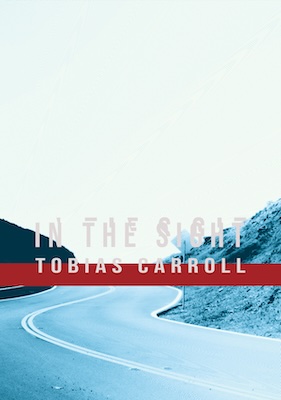Drinking coffee from a Styrofoam cup with chewed rim. Choosing hotel rooms based on which has the fewest number of 2 A.M. fights in the parking lot. Calling your guy in Pittsburgh from a payphone in Dayton to ask about the Tampa connection who might be dead.
This is the America of Carroll’s fifth book and his first journey into the road novel. In place of the poetic flights of Kerouac, where random joy rescues the protagonist from despair, Carroll levels his finger to a landscape that burns to the touch.
Farrier is the novel’s protagonist. He’s the sketchy but nondescript guy who’s constantly being mistaken for a musician. It’s an association he has come to expect, as both a conversation-starter and mask for his true purposes. The reader is never quite informed what these purposes are, but they are given enough evidence to conclude they could get Farrier killed at any time. The novel’s tension arises from such percarity. Farrier is the low-life guide, waking late in the day and driving at odd hours from one gas station mini-mart to another. The people he meets come into focus or blur depending on how deep into the night Farrier is and whether the substances he’s consumed are cycling through or cycling out of his metabolism. Redemption is never mentioned but nudges a Farrier at odd moments when he has settled into his favorite room in his preferred sleazy motel and tries to tell himself he is safe.
I talked to Carroll about the movies, books and music that influenced In the Sight, along with how he was able to fictionalize an abstract, post-everything system that seems to have poisoned the land we are standing on.
William Lessard: The opening reminds me of that famous Kerouac quote, “Nothing behind me, everything ahead of me.” What is it about the road novel that is so attractive?
Tobias Carroll: There’s a similar Adrian Tomine quote to that one that I read during my formative years and took to heart. (Which isn’t to say that I didn’t also read some Kerouac during my formative years, because I absolutely did.) I think some of it is inherent to that quote: that sense of possibility, of openness; even of mystery.
In some ways, I think it’s a way to make the picaresque form more modern — which isn’t to say that a picaresque narrative can’t also be modern. (See also: several selections from the bibliography of André Alexis.) And I think there’s also something—at least in the U.S.—that’s relatively shared about being behind the wheel of a car or truck. It’s something of a great equalizer. Someone reading In the Sight has probably not dabbled in brain modification, but they do know what it’s like to drive down a highway late at night.
Being behind the wheel of a car or truck, it’s something of a great equalizer.
In the Sight was written pre-pandemic, and I’m wondering now if there isn’t space for a very different kind of road novel. I started driving a lot more during 2020, in part because it felt like one of the only ways to explore safely. (I was also in wretched physical shape at that point and was a lot less mobile than I’d have liked to have been.) More recently, I see a lot more pent-up hostility on the roads — more honking, more shouting, more cursing. My deeply scientific take on it is that it’s a result of repressed emotions coming out of the pandemic, and I think there’s probably a good story to be told against that backdrop — but I don’t have one to tell quite yet.
WL: I have been trying to come up with a clever, one-line description of the book. Best I could manage was “Glengarry, Glen Ross” goes coast-to-coast. How’s that?
TC: I don’t think I’d ever thought of this book as having Mamet-esque vibes to it — though now that you mention it, I’m wondering if there isn’t a little bit of The Water Engine to it. (Ages ago, I saw a production of it paired with the one-act Mr. Happiness, which was performed by the great Bob Balaban; bits and pieces of both have been in my head ever since.)
My elevator pitch, such as it is, has been something in the vein of: “One man’s business rewiring people’s brains comes back to haunt him.” Though I’m also not sure how effective an elevator pitch that is, nor have I ever actually pitched someone in an elevator.
WL: I like your characters. But I don’t think I could hang with them.
TC: That’s wholly understandable. The bulk of my central characters up to this point have been, I think, relatively sympathetic — with (spoilers) the arc of Virgil Carey’s life in Ex-Members being one big exception. Farrier was definitely born out of wanting to write someone who was a little more of an overt anti-hero — someone who’s made a series of bad decisions and now has to live with the consequences.
I did an event in Chicago with Juan Martinez, and he observed (accurately) that Farrier is, essentially, a drug dealer in all but name. Farrier is definitely doing things that are not ethically okay; he has, 100%, not thought through all of the things that he’s opted to base his life around. I do think that some of his friends and acquaintances are more hang-out-with-able — but then, they have the good sense to not be at the center of this book.
WL: There is a precariousness about the story, although it is never made clear what your main character Farrier is doing. The unease reminds me of Severance or an episode of Black Mirror.
TC: I am very grateful to you for those two points of comparison! Yeah, I was a lot less interested in the mechanics of how Farrier’s brain alteration system works and more with what it would do if it was out in the world. My first point of training in storytelling came from film, which means that I can ramble on for hours and hours about the concept of the MacGuffin.
I also knew that I wanted to write something that was a little less realistic than its predecessor, even though Ex-Members ended up having a few more surreal moments in it than I had initially planned. I think Jonathan Lethem’s Amnesia Moon and Neil Gaiman’s American Gods were both subtle influences on this one — both American road novels that aren’t set squarely in our own reality. (And, what the hell: regenerations in Doctor Who, too.)
WL: The America in this novel is the America of the shitty gas station sandwich. Having written political essays in the past, you seem attuned to this reality.
TC: Yes indeed. It’s funny — to bring things back around to the Juan Martinez conversation, one of the things that came up was that this book ended up being fairly Philip K. Dick-esque (or phildickian, as they day) without me consciously thinking of Dick’s work at all. And I think there’s a version of this that’s more self-consciously phildickian and more self-consciously political.
A lot of the book was informed by a DIY book tour duncan b. barlow and I embarked upon in 2017, which took us from Santa Fe to Chicago. I’m a lifelong Northeasterner, so I’m genuinely not used to the practice of driving for eight hours in a given direction and not seeing much of anything — I think you’d have to try very hard to do that in the New York metropolitan area. And recently, I did a bunch of Rust Belt and Midwestern events that involved similarly long drives. I will say that I largely avoided gas station sandwiches out of fear of intestinal distress. Though I did spend a month in 2019 at a residency in Iceland, and found myself borderline-obsessed with the premade grocery store sandwiches there.
That said, I did dine at a Sheetz on my last night of this most recent tour. I’m not sure that counts as a gas station meal or not, but: it was far better than I was expecting. Though it was also not a sandwich.
WL: The aristocrat is my favorite character in this book. He is a person I’d like to punch in the face, but wouldn’t mind having a drink with. Am I a weirdo to feel this way?
There’s a lot that I like about realism in literature, but there’s also something fun about creating a heightened version of reality.
TC: You are not! Those scenes were some of the most fun for me to write in the novel. In part, I think the Vinstaden sequence was where the book really clicked into place for me — that it was as much about the idea of what could be on the road as it was about what was actually on the road. When I was a kid, I remember not quite understanding how things like “zoning” or “retail” worked and imagining some kind of shop of miracles being located right around the corner, even though I know now that that would be impossible.
So, part of In the Sight is about embracing the impossible or unlikely and putting things in the landscape that might not be there in real life. Weird bird sanctuaries. All-night coffee shops, far from anything else. There’s a lot that I like about realism in literature, but there’s also something fun about creating a heightened version of reality.
WL: Washburn is the closest Farrier gets to family. Is the road what he has instead of family or are such binaries not relevant?
TC: I don’t see the open road being Farrier’s family, but I do see him in a kind of self-imposed exile from his own family, for sure. I think that aspect of In the Sight might just come from its position as the book I wrote after Ex-Members, which had a lot of familial relationships in it. This book, and the book I’m working on now, are much more about protagonists who are on their own by choice. I’m not entirely sure why that is — it might just be that I’m thinking about my own solitude more and more. I’ve never been married; I have no children. I’m an only child as well. And I think Farrier also exists as a kind of cautionary tale for me — that this is what could happen (metaphorically speaking) if I went too far down a certain path.
On one hand, Farrier’s enviable: he works for himself! He’s a genius! He’s an innovator! He travels the country! On the other hand, he has no safety net, what he does is illegal, and his physical safety is no longer guaranteed. The postpunk band Beauty Pill has an album called The Unsustainable Lifestyle, and that phrase seeps into my consciousness and haunts me at regular intervals.
WL: Farrier reaches the end of his journey as someone who will either decide to kill themselves in the next hour or see what tending bar feels like for a little while longer.
TC: I don’t think he’s going to end his life, but there is a question of whether he’ll undergo his own process and remake himself. There’s something about leaving a character like that in a kind of purgatory; I don’t know. I was a little surprised at how the ending turned out. I basically backed Farrier into a corner….and then Farrier decided to set up shop in the corner. And I think that’s fine. He may have found something of a moral compass, he may not. But I do feel like he’s changed sufficiently from the person the reader meets on the first page. I’m glad to know that the ending has resonated with people as well.
Read the original article here

